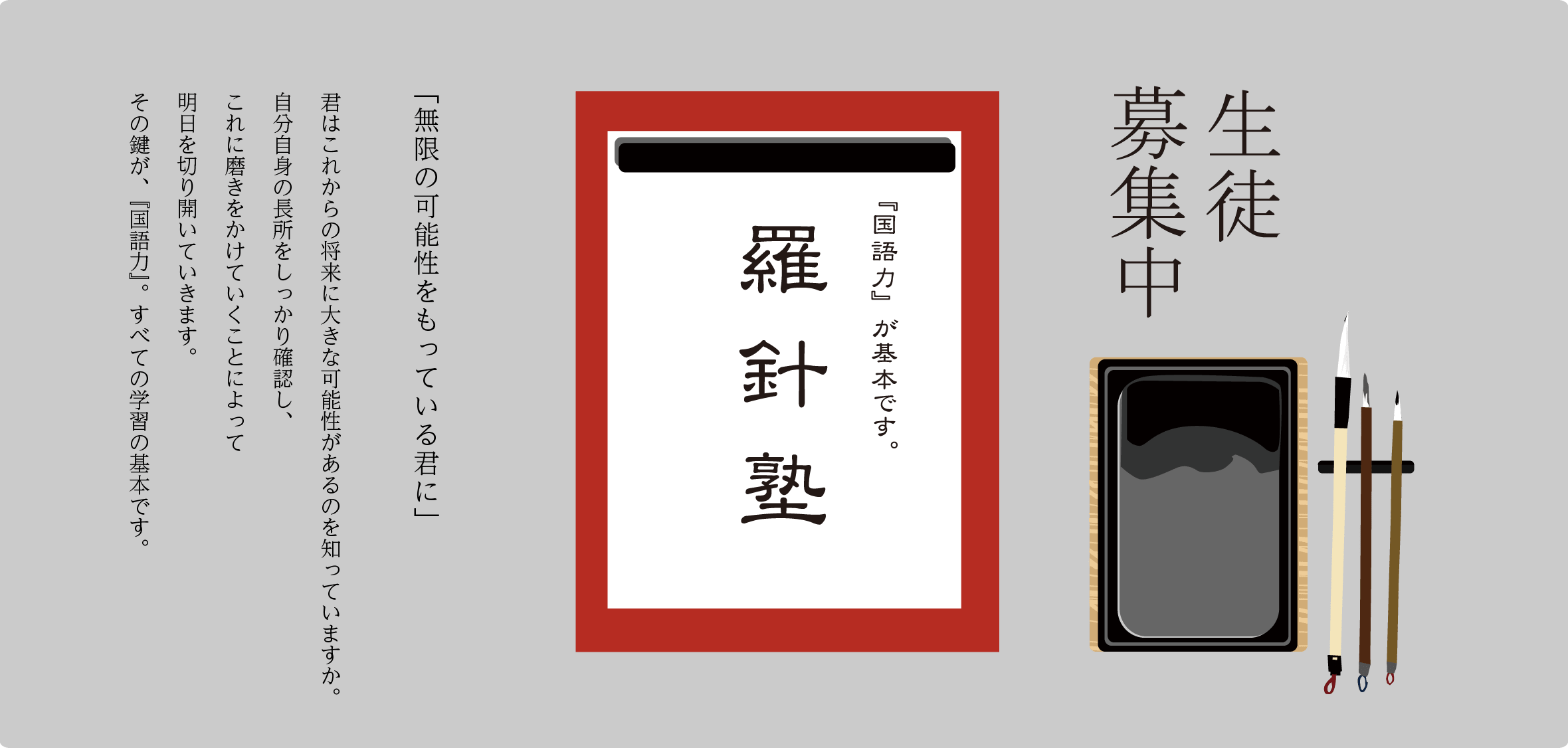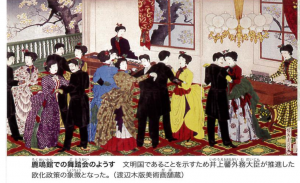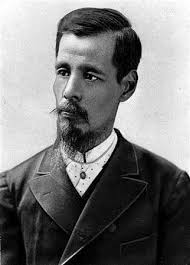長崎市五島町にある羅針塾 学習塾・幼児教室 https://rashinjyuku.com/wp では、「てにをは」の使い方を幼児期からしっかりと教えていく必要があると考えています。
「てにをは」とは、助詞の古い呼び名です。
昔、漢文を読む際、漢字の周囲に点を打ち、その位置で読み方を示す方法があり、左下から順に四隅をテニヲハとあてたことに由来します。
本来は助詞だけでなく、助動詞、接尾語など、補助的な働きをするものの総称です。「は」「を」「が」「も」「に」など、語句と他の語句との関係を示したり、文章に一定の意味を加えたりする言葉が、「てにをは」と呼ばれます。
さて、
『新しい歴史教科書』(新版・中学社会)(自由社)英訳シリーズ Section 3の英和対訳部分からの引用です。http://www.sdh-fact.com/CL02_2/Chapter%204%20Section%203,%204.pdf
Rokumeikan Hall and the Normanton Incident
In 1883 (Meiji 16), the government constructed a Western-style building in Hibiya, Tokyo, called Rokumeikan Hall, which was to be the site of many lively dance parties to which foreigners were always invited. The objective was to use these parties to show the world that Japan was a civilized country like the Western powers and thus promote the cause of treaty revision. In 1886 (Meiji 19), the Normanton Incident, a case of serious criminal negligence on the part of a British sea captain, again highlighted the need for treaty revision.(*2)The consular court examining the case gave the captain of the Normanton a light sentence of just three months imprisonment, which further inflamed Japanese public opinion.
鹿鳴館での舞踏会の様子
鹿鳴館とノルマントン号事件
1883(明治16)年、政府は東京の日比谷に鹿鳴館という洋風建築物を作り、外国人を招いてさかんに舞踏会を開いた。日本も欧米並みの文明国であると世界に誇示し、条約改正を有利に進めようとする試みだった。1886(明治19年)、ノルマントン号事件(*2)が起きた。審査をしたイギリス領事裁判所は、船長を金庫3ヶ月という軽い罰にしたので、国民の反発はさらに強まった。
*2=The British steamship Normanton sank off the coast of Wakayama during a rainstorm. Though the British captain and his crew escaped on lifeboats, all twenty-five of the Japanese passengers were abandoned on board and perished at sea.
(*2)イギリスの汽船ノルマントン号が和歌山沖で暴風雨のため沈没。このとき船長以下、イギリス人船員は救命ボートで脱出した。しかし、日本人乗客は放置された25人全員が溺死した。
Treaty revision: The fruit of forty years of effort
Japan remained undeterred in its quest to gain equality with the Western powers in spite of their continuing rejection of treaty revision. One of the reasons that Japan promulgated the Meiji Constitution in 1889 (Meiji 22) was to further the treaty revision process.
Over time, Japan’s progress towards modernization was recognized by Great Britain, then the world’s most powerful country. With the additional motivation of countering the expansion of its rival Russia into East Asia, Britain reached out to Japan and signaled its willingness to negotiate the subject of treaty revision. Foreign Minister Mutsu Munemitsu, who was in charge of the negotiations with Great Britain, successfully concluded the landmark Anglo-Japanese Treaty of Commerce and Navigation in 1894 (Meiji 27), just prior to the start of the First Sino-Japanese War. According to the terms of this agreement, Great Britain renounced extraterritoriality in exchange for the right of its citizens to freely live, travel, and conduct business in Japan. After Japan’s subsequent triumph in the First Sino-Japanese War, many other countries, including the United States, followed suit and also abolished consular jurisdiction. Tariff autonomy took longer to regain, coming only after Japan defeated Russia in the Russo-Japanese War. In 1911 (Meiji 44), Japan struck a deal with the United States to allow Japan to set its own tariffs, finally ending the campaign to revise the unequal treaties that had been set in motion forty years earlier by the Iwakura Mission.
40年がかりの条約改正
欧米諸国はそれでも、条約改正に応じようとはしなかったが、日本は対等な国になろうと努力を重ねた。1889(明治22)年、日本が憲法を制定した動機の一つは条約改正だった。
やがて、最大の強国イギリスは、こうした日本の近代化の努力を認め、また極東に進出してきたロシアに対抗するためもあって、日本との条約交渉に応じた。交渉の責任者だった陸奥宗光外務大臣の努力が実を結び、日清戦争が始まる前1894(明治27)年、日本は国内での自由な居住・旅行・営業を外国人に認めるのと引きかえに、治外法権が撤廃された(日英通商航海条約)。その後、日清戦争に日本が勝利したのち、アメリカをはじめ各国とも領事裁判権を廃止した。関税自主権の回復はさらに遅れ、日露戦争に日本が勝利した1911(明治44)年に、アメリカとの交渉に成功した。岩倉使節団の交渉から40年の歳月が経っていた。
An Excerpt from Foreign Minister Mutsu Munemitsu’s Speech to the Diet on Treaty Revision (1893)
“The goal of treaty reform, or more accurately the goal of Japanese diplomacy, is to receive the rights befitting of every nation and carry out those duties to which every nation ought to commit itself. That is to say, the Empire of Japan, though located in Asia, wishes to receive special treatment from the Western powers beyond that which they have afforded to the other nations of Asia. Since that is the case, Japan must introduce domestic policies different from those of other Asian nations and the Japanese people must also demonstrate a unique spirit of enterprise beyond that of other Asian peoples.”
(Mutsu was emphasizing the implications of opening up the country and allowing foreigners to travel and work freely within Japan in exchange for the abolition of extraterritoriality.)
条約改正に関する外務大臣・陸奥宗光の議会演説(1893年)
「条約改正の目的、否、日本外交の目的は、国として受けるべき権利は受け、国として尽くすべき義務を全うすることにあります。すなわち、日本帝国が、アジアの中にありながら、欧米各国から、他のアジアの国が受けられない特別の待遇を受けようというのでありますから、それならば、日本国内でも他のアジアの国にない政策、方針を行い、日本人民も他のアジアの国にはない特別な進取の気性を示さなければならないのであります。」(国会議事録より抜粋)
*治外法権の撤廃と引き換えに、日本の内地を解放し、外国人の自由な活動を認めることの意義を強調したもの。
陸奥宗光
The Achievement of Mutsu Munemitsu
While serving as Resident Envoy to the United States and Mexico, Mutsu Munemitsu entered talks with the government of Mexico and negotiated a trade treaty in 1888. This was the first equal treaty Japan had signed with any nation outside of Asia. It affirmed tariff autonomy and granted consular jurisdiction to both parties. This achievement formed the basis for Japan’s later success at revising its treaties with the Western powers.
陸奥宗光の功績
駐米公使兼駐メキシコ公使であった陸奥は、メキシコに働きかけ、1888年、通商条約を締結した。これは日本がアジア以外の国と結んだ最初の平等条約で、関税自主権を確立し、領事裁判権を互いに認めものである。日本はこの実績をもとに、西洋諸国との条約改正に成功していった。
・・・筆者の中学生の頃、教科書は異なりますが、このような記述を読んだ時、欧米諸国との不平等条約の改正、にどれほどの苦心惨憺があったのだろうか、と考えたものでした。その後、様々な書物に触れる内に、時代背景や国際関係、国際金融、軍事力(power of balance)など様々な事柄が複雑に絡み合っているものを、一つ一つ解きほぐすかのように解決していった事が分かり、日本の先人達の努力に頭が下がる思いがします。現在の日本人である子供達にも、年代に応じて解説してあげれば、先見性や洞察力を涵養することになると考えます。










